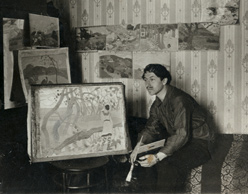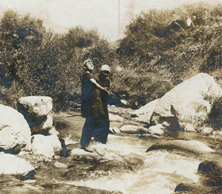|
1916–1917
Teaches graphics in various schools in Tashkent.
1917–1918
Teaches drawing at the Tashkent teacher’s institute.
1919
Appointed director of the Tashkent arts museum located in the former palace of the Grand Duke Nikolai Romanov.
1919–1922
Worked as artist and head teacher at the Turkestan peoples’ arts school.
1920
First one-man exhibition at Turkestan University in Tashkent.
1920–1921
Works as instructor of the schools’ department of Peoples’ Committee for Enlightenment organizing the artistic education in Muslim primary schools. Helps found 12 childrens’ clubs in the Old Town.
1921
Second one-man exhibition at Turkestan University.
1921
Meets the poet Sergey Yesenin. In the 1920’s Volkov was friends with a number of poets living in Tashkent including Valentin Volpin, Georgij Svetlij (G. Pavliutchenko) .
1921–1922
Teaches at the pedagogical faculty of Turkestan University. Head of the art teachers’ studio. Teaches in the Regional Muslim High School.
1922–1923
Illustrated the manuscript of the poem“ Caravan and Teahouse”
1922
Worked as a decorative artist at the studio of the Proletcult worker’s theatre. Drew sketches for costumes and scenery. |
1922–1923
Completes three big “Caravan”paintings in oils.
1923
Third one-man exhibition at Turkestan University.
1920–1923
The Central Asian Art Museum in Tashkent bought fourteen of Volkov’s paintings.
1923
One-man show of 120 paintings at Moscow University’s club for workers from the East. Volkov met the art critics Yakov Tugenhold and Sidorov, who reviewed his exhibition in the newspaper “Pravda” on 17th November.
1923
Teaches sketching at the Peoples’ House art studio in Tashkent.
1923
“1923. Rhythm in painting and poetry. Dance. Bukhara. Roads. Spaces. The full voice of the palette. National form. Life is full of movement and noise. Joy – Colour. Music, the traveled road. My paintings respond. Tea houses, caravans, camels. Symphony and rhythm. The system of triangles”.
1924
Painted the “Pomegranate Teahouse”. “Having explored various styles – futurism, cubism, expressionism, I arrived at the primitive and began working with triangles. I achieved what was a simple but strong and expressive composition. This cycle of work came to an end in 1924 with the painting “Pomegranate Teahouse”- my symbol of faith”.
1924–1927
Writes a second series of poems, “Nomadic Days”.
|




